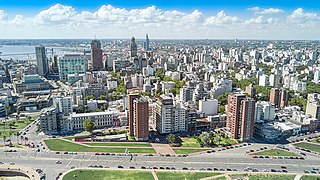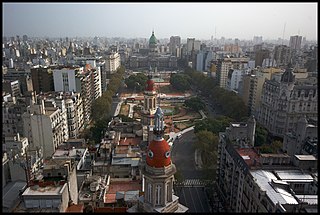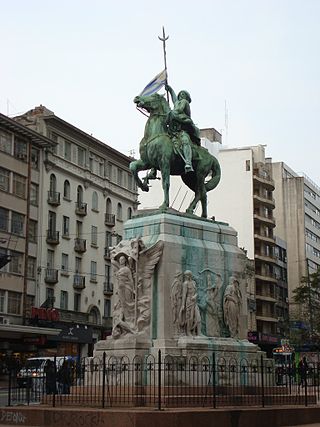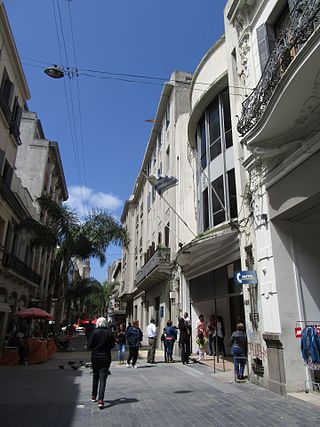
Montevideo is the capital and largest city of Uruguay. According to the 2011 census, the city proper has a population of 1,319,108 in an area of 201 square kilometers (78 sq mi). Montevideo is situated on the southern coast of the country, on the northeastern bank of the Río de la Plata.

Brazo Oriental is a barrio of Montevideo, the capital of Uruguay. Brazo Oriental is a residential zone located approximately 5 kilometres (3.1 mi) from Montevideo's centre.

Centro is a barrio of Montevideo, Uruguay. Its main axis is 18 de Julio Avenue, and it runs between Plaza Independencia and Ejido St, being the central business district.

Plaza Independencia is the most important city square in Montevideo, Uruguay, laid out in the 19th century in the area occupied by the Citadel of Montevideo. In its center is a monument to General José Gervasio Artigas, and below it, his mausoleum.

Avenida 18 de Julio, or 18 de Julio Avenue, is the most important avenue in Montevideo, Uruguay. It is named after the date on which the country's first Constitution was sworn in, on July 18, 1830.

The Rambla of Montevideo is an avenue that goes all along the coastline of Montevideo, Uruguay. At a length of over 22.2 uninterrupted kilometres (13.7 mi), the promenade runs along the Río de la Plata and continues down the entire coast of Montevideo. Since all the southern departments of Uruguay are against either the Río de la Plata or the Atlantic Ocean, they all have ramblas as well. The Rambla is an integral part of Montevidean identity and has been proposed as a World Heritage site.

Congressional Plaza is a public park facing the Argentine Congress in Buenos Aires. The plaza is part of a 3 hectare open space comprising three adjoining plazas to the east of the Congress building. The Kilometre Zero for all Argentine National Highways is marked on a milestone at the Plaza.
José Belloni was a Uruguayan sculptor of the Realist school.

The World Trade Center Montevideo is a building complex located in Montevideo, Uruguay. It was officially opened in 1998, and renovated between 2002 and 2009.

Cordón is a central barrio of Montevideo, Uruguay, located East of the Centro. Its main avenue is 18 de Julio Avenue.

Parque Rodó is both a barrio of Montevideo, Uruguay and a park which lies mostly outside the limits of the barrio itself and belongs to Punta Carretas. The name "Rodó" has been given in memory of José Enrique Rodó, an important Uruguayan writer whose monument is in the southern side of the main park.

Punta Gorda is a barrio of Montevideo, Uruguay. It takes its name from the promontory of Punta Gorda.

Bella Vista is a barrio of Montevideo, Uruguay and part of the Capurro / Bella Vista composite barrio, with Artigas Boulevard separating the two.

Avenida 8 de Octubre is one of the main thoroughfares of Montevideo, Uruguay, extending 3.5 miles from Tres Cruces at the intersection with 18 de Julio Avenue to Maroñas, where it turns into Camino Maldonado.

Plaza de Cagancha is a public square in barrio Centro of Montevideo, Uruguay. Located on 18 de Julio Avenue, the main avenue of the city, it originated in 1836 as the central space of the layout of the "Ciudad Nueva", outside the limits of the walled area of the colonial period.

Libertador Avenue is a major avenue in Montevideo, Uruguay. It stretches north from the Legislative Palace in Aguada to Plaza Fabini in Centro, and is named after Juan Antonio Lavalleja, revolutionary figure and politician, who led the group of the Thirty-Three Orientals in the insurrection for the independence of Oriental Province.

Palacio Rinaldi is a building in Centro, Montevideo, Uruguay, located on the Plaza Independencia near its junction with the 18 de Julio Avenue, near the Palacio Salvo.

Peatonal Sarandí is an 0.5 miles pedestrian street in Ciudad Vieja, Montevideo, Uruguay. It is the main lane of the historic center, and one of the most touristic sites in the city, due to the fact that it is flanked by different architecturally notable buildings. The pedestrian street starts at the Gateway of the Citadel and ends at its intersection with Peatonal Pérez Castellano, while the remaining four blocks, up to the Rambla, are allowed for vehicles. As an extension of this street is the long southern breakwater of the Port of Montevideo, which has taken on the name "Escollera Sarandí".

Democracy Square is a road junction and public space in barrio Tres Cruces of Montevideo, Uruguay.





















